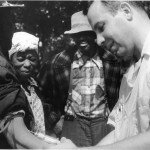In defense of an icon: What it really takes to advance a Black Agenda
African Americans, Featured, Politics — By Avis Jones-DeWeever on March 24, 2010 at 7:01 amToday marks the 98th birthday of civil rights and women’s rights icon, Dr. Dorothy I. Height. I have had the distinct honor and privilege to work by her side for nearly three years now. In that short time, I have come to know her and marvel at her ability to personify an exceedingly complex set of qualities found only among the best of us. I have witnessed her wisdom, her persistence, her quiet patience, and at times, her bold defiance. But most of all, I have revered her deep love and commitment to her people; a commitment that has spanned over three quarters of a century now, and a commitment that lasts to this day.
Though she has long-since earned the right to retire and live out the rest of her days carefree and in relative ease, Dr. Height has chosen to forego that luxury and instead, continue the fight. Through good times and in bad, she has stayed the course, she has run the race, and she has done it all with exceeding levels of dignity and grace.
It is because of my deep personal knowledge of her sincere commitment to the causes to which she has devoted her life that recent statements made by both Tavis Smiley and Sophia Nelson are to me, particularly disturbing and in need of response.
A few weeks ago Smiley, appearing on the Tom Joyner Morning Show, sharply criticized Dr. Height along with several other Black leaders who had recently engaged in a private meeting with President Obama. Smiley’s attack, seemingly based on statements made immediately following that meeting, consisted of the assertion that these leaders had failed to endorse a need for a Black Agenda, and so—surprise, surprise—he was to hold a State of the Black Union-like event to which these leaders had been invited to justify their positions and discuss the issue with others. The hook here was to hold the President accountable to a community that had been critically important to his electoral success. On the surface, his argument seemed logical, if not compelling, but it had one fatal flaw—it just wasn’t true.
The first accuracy-challenged assertion was the implication that Dr. Height actually attended the meeting that apparently raised Smiley’s ire. That sneaky connotation is, for lack of a kinder, gentler term, a lie. Dr. Height failed to attend that day having been immobilized as a result of the record-breaking blizzard which had befallen the nation’s capital. Though this lie may have been unintentional, one would think that a minimal level of professional ethics would have necessitated the due diligence of a fact-check. Apparently though, letting facts stand in the way of a rousing argument proved too high a standard for Smiley to bear.
The second departure from reality took place when Tavis asserted that the leaders he had chastised had in-fact been invited to his own personal Obama-Bashing event scheduled to take place in Chicago. In fact, Dr. Height learned of his planned affair on the same day everyone else did and in the same way as the rest of us, by listening to Smiley’s Don King-like performance on the Tom Joyner Morning Show. What’s more, her desire for more information about his rant caused her to direct her staff to contact Smiley’s assistant to request the invitation that he claimed on air was already provided.
Third, and most importantly, neither Dr. Height nor any of the other actual meeting attendees have ever asserted that there was no need to address the dire circumstances that the Black community faces. To the contrary, it was in recognition of this need that these leaders requested an audience with the President. Real leadership doesn’t just talk about power, it talks to power. It doesn’t just pontificate, it activates. Herein lies the difference between the Heights of the world and her all-to-eager, yet significantly less-effective critics. She understands and lives by the knowledge that as important as words are, they alone don’t produce change—real change happens as a result of action.
That’s why even before the President took office, NCNW produced its own Black Women and Families Agenda for Change, provided the document to the Presidential transition team and engaged in various meetings on numerous policy issues of concern to the Black community well before Inauguration Day. The implementation of this agenda also spawned the development of a series of Policy Clubs interspersed throughout the country. These clubs provide a structure upon which Black women gather regularly to be informed about critical issues and then engage in strategy and action around those policy concerns they deem particularly vexing.
Most recently, implementation of this agenda led to the distribution of nearly 50,000 e-mails encouraging women to get involved in the health care debate by calling their Representatives to ensure their voices were heard and acted upon. And with the recent ground-breaking health care victory, we now know that their voices were among those who helped this nation achieve a victory it had been in pursuit of for nearly a century.
These are just a few of the tangible ways in which one actually works on behalf of change rather than merely staging corporately-sponsored spectacles seemingly in support of it. I wonder, given their overriding concern regarding the advancement of a Black Agenda, just how many Black people either Smiley or Nelson has actually registered to vote, informed regularly about the issues, or provided tangible vehicles with which those at the grassroots level could actually get involved in the policy process?
Sure Black folk are still disproportionately hurting in the wake of the deepest recession this nation has witnessed in eighty years. And yes, there’s much more that’s left to be done. But a sophisticated understanding of the political process certainly knows that both an inside game and an outside game must be waged in order to maximize the chances of success. However, only a few know how to do both simultaneously. Perhaps instead of criticizing our devoted elder, those two ought to pull out a pad and pencil and start taking notes.
Tags: African-Americans, Barack Obama, black agenda, dorothy height, Obama, PoliticsAuthor: Avis Jones-DeWeever (4 Articles)

Avis A. Jones-DeWeever, Ph.D. is the Director of the Research, Public Policy, and Information Center for African American Women. The RPPI Center is a research/action institute based at the National Council of Negro Women which seeks to inform, catalyze and mobilize African American women for change in both the policy arena and throughout the broader cultural dynamic. Dr. Jones-DeWeever is the author of numerous publications focused on policy-issues of particular importance to women of color. A selection of her works include: Losing Ground: Women and the Foreclosure Crisis; Black Girls in New York: Quite Strength, Bold Resilience; Women in the Wake of the Storm: Examining the Post-Katrina Realities of the Women of New Orleans and the Gulf Coast; and The Black Women and Families Agenda for Change. In addition to her written contributions, Dr. Jones-DeWeever is a highly sought-after political commentator and public speaker. Her policy perspectives have been shared through a variety of media outlets including: CNN, PBS, ABC News Now, Voice of America Television, the Canadian Broadcasting Corporation, National Public Radio, Sirius and XM Radio, Glamour Magazine, Pink Magazine, Essence Magazine, the New York Times, the Washington Post, the Huffington Post, and Vital Speeches of the Day. Dr. Jones-DeWeever received her Ph.D. in Government and Politics from the University of Maryland, College Park. She serves on the Board of the Women’s Voices. Women’s Vote. Action Fund and maintains the position of Affiliated Scholar with the Institute for Women’s Policy Research.



 Share This
Share This Tweet This
Tweet This Digg This
Digg This Save to delicious
Save to delicious Stumble it
Stumble it





 A New Lesson from the Old "Tuskegee" Study
A New Lesson from the Old "Tuskegee" Study Native American veterans claim racial discrimination by VA in South Dakota
Native American veterans claim racial discrimination by VA in South Dakota “Keep your #blackthoughts to yourself”: The Privilege of Twitter
“Keep your #blackthoughts to yourself”: The Privilege of Twitter Black vets: complicated past, unsung present
Black vets: complicated past, unsung present







